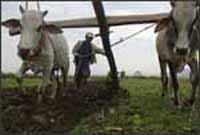
| SEPTEMBER, 2010 - VOL.18 NO.9 |
Global Warming Poses New Risk to Burma’s Rice Revival
 |
| A Burmese farmer ploughs a field to grow peas after the first rains in Naypyidaw in May. (Photo: AP) |
Judge Rejects ‘Sweetheart Deal’ on Barclays Sanction Busting
A Washington judge criticized the US government for accepting a plea deal with Barclays, a leading UK bank, after it was found to have done business with countries targeted by US sanctions. Judge Emmett Sullivan said the $298 million fine imposed on Barclays for carrying out illegal transactions worth $500 million over an 11-year period amounted to a “sweetheart deal” for the bank, which had been found guilty of violating the International Emergency Economic Powers Act and the Trading with the Enemy Act. Citing court documents, Reuters reported that “Barclays violated both US and New York State criminal laws by knowingly and willfully moving or permitting to be moved hundreds of millions of dollars through the US financial system on behalf of banks from Cuba, Iran, Libya, Sudan and Myanmar [Burma].” Britain’s Guardian newspaper quoted American prosecutors as saying “Barclays staff stripped identifying names from payment information in a deliberate ruse to defy US sanctions against repressive regimes.” The illegal transactions included 46 fund transfers worth $490,000 involving Burma, according to the newspaper.
Massive China Investment Claim ‘Far-fetched’
Claims by The Myanmar Times that China invested US $8 billion in May alone have been dismissed as exaggerated. The Rangoon newspaper said the amount is the sum total of plans for two giant hydroelectric projects in Kachin State, gas and gas pipelines from the Bay of Bengal coast, and a copper mine. “This is a bit far-fetched to say the least,” said Collin Reynolds, an energy industries consultant in Bangkok. “The pipelines were agreed to months ago and their development cost is being shared by other oil firms, such as India’s [Oil and Natural Gas Company], and will be spread over several years.”
Thailand Seeks to Dilute Cost of Developing Burma Gas Fields
Thailand’s oil and gas developer PTTEP says it wants to sell minority stakes in five gas blocks in Burma for which it has exclusive exploration and production licenses. The Thai government-controlled company has 100 percent ownership of the development rights in the blocks, which include the rich M9 Block in the Gulf of Martaban. The move came just two weeks after PTTEP signed a deal with Burma’s junta-controlled Myanmar Oil and Gas Enterprise to buy 80 percent of the gas produced from M9.
New Private Bank Opens in Naypyidaw
The Asia Green Development Bank, owned by Tay Za, one of Burma’s richest men, opened for business in August in the capital Naypyidaw—far from the main business city of Rangoon, where 13 out of 15 private banks in the country operate. The bank is one of four recently approved by Burma’s ruling regime, all owned by businessmen targeted by international sanctions for their close association with top generals. “It might reasonably be supposed that such entities are unlikely saviors of Burma’s financial sector, or of its international credibility,” said economist Sean Turnell.
Thai Bank Offers Burmese-language ATM Service
A private bank in Thailand, Kasikorn Bank, has added a Burmese-language option to about 100 ATM machines intended for use by Burmese migrant workers. The system was introduced in February and will be expanded into areas where Burmese migrants are concentrated, according to a report in The Bangkok Post. Eighty percent of the bank’s ATMs in Samut Sakhon in Muang District will offer the feature. ATMs in Petchaburi, Prachuap Khiri Khan, Ranong and Trang provinces also will offer the service.